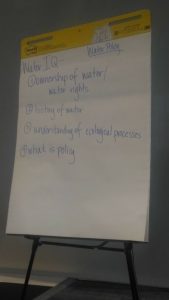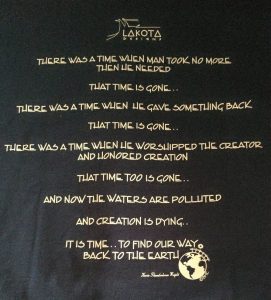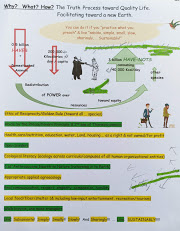Rule of Law. “It’s the Law!” Natural Law. The Law. The Constitution. Neighborhood Association Laws and Regulations. Housing Codes. Motor Vehicle Law. City ordinances. Food and Drug Laws. Pesticide Law. Seed Law. Conservation District Regulations. Animal Welfare Law. Affirmative Action. Reparations. U.N. Declaration of Human Rights. The U.N. Agenda 21 Plan.
(Sometimes my head spins with this legalese and concern over associated mores.)
I strongly believe in good and more than adequate governance and laws and regulations. And, I am a conservative in terms of respecting many tried-and-true traditions and taboos, honoring the positions of elders, and of conserving
- what may exist as a fair, just, and humane social fabric, as well as
- the natural resource base and homeostatic symbioses.
(G. Tyler Miller, Jr., who wrote many books related to applied ecology, emphasized in his “Principles of Understanding and Sustaining the Earth” that the principle of true conservatism is
“Don’t ever call yourself a conservative unless what you want to conserve is the earth.”)
On the other hand, I also fervently believe in attempting to right the wrongs (through reparations, affirmative action, redistribution of wealth and power, “Medicare for all,” “free” public education) of constitutional, legislative, and legal precedents from previous administrations and generations which have resulted in serious inequities. Some of these wrongs include colonization and intrinsic genocide of indigenous peoples, slavery, disenfranchisement, segregation and unequal education, Jim Crow sins, red-lining, unequal enforcement of laws, pervasive incarcerations, wars and subsequent land, resource, and power grabs, and other discriminatory, social unjust, inhumane, and ecologically unsound actions/practices of the past and present. This would definitely also include righting the wrongs in our “sacred” constitution(s) and in “holy” religious books no matter how long they may have been around.
However, I must admit I am not certain how I might precisely and accurately label my socio-political/economic or ecological positions. Probably democratic ecosocialist? Or maybe communitarian? Or ecological Marxist?? But certainly not morally and ethically corrupt Trumpist, conservative Republican, or right wing-libertarian, and probably not anarchist. Perhaps a leftist-libertarian socialist. (I suppose I could just play dirty pool and say that I am basically an advocate for la mejor mezcla [¡No! Not mezcal!] of these and other political ideologies and practices which might be the best fit for desired outcomes of quality life for all for as long as possible, given the psychological, socio-economic/ecological characteristics of a local, regional, or national geographic area in terms of what can really be done and will truly fit.)
I am not a fan of free market, neoliberal capitalism. This system has disrupted the resilient and sustainable social fabric of traditional cultures and of demes, populations, and ecological communities of many other species. It has a deplorable history of being exploitive of the Commons and the Land on which sustainable cultures hunted and gathered and practiced traditional sustainable agriculture, and on which the people of these cultures lived healthy lives, which were to a large extent in concert with symbioses. In order to approach sustainability, capitalism must be severely regulated. (My biggest concern with the Trumpian wave is his pro-neoliberal capitalistic rhetoric, positions, and proposed policies which are anti-governmental regulation. However, I also do not hesitate to add that even though she was/is not so manipulatively vocal and overt about it, many of Hillary Clinton’s proposed policies were also de facto neoliberal and certainly capitalistic and were not what is needed to help move us significantly from Eaarth to a neo-Earth.)
I do believe that a participatory democratic process is generally essential to an achievement of a healthier Eaarth. However, there must be checks and balances such that money, power, elitism, and might do not make right and that the tyranny of the majority does not squash the rights of minorities.
Below I present a sort of hierarchy of laws and regulations affecting and employed by human societies. Nevertheless, I am reluctant to state that one level is more important than the others. Moreover, there is considerable overlapping. I will say that the physical laws and scientific laws will ultimately rule, and that Natural Law is, in reality, the most important law concerning homeostatic symbioses (if we wish to include humans).
1.Physical Laws (“Ruling” the Cosmos)
- Scientific Principles (The little we humans know that is quite solid and certain. This includes the big bang theory, the laws of thermodynamics, Newton’s laws, the theory of relativity, the theory of evolution.)
- Biological & Ecological Principles (Important to us because they deal with quality life on Earth)
- Natural Law (Ethics and morals which should be involved in all the law which follows this below, and should always have precedence)
- International Law
- Federal Law/Constitutional Law (which should recognize and abide by international law in moral and ethical ways)
- State & Local Law (which includes federal/constitutional law)
- Tribal Rules
- Local Customs
- Family Traditions
- Individual Ethos
pbm
[ 7Ss / VV->^^ ]
……………………………………………
*I wrote this after several weeks of frustrations in dealing with the legal walls a desperate but kind and humble young man from Central America was facing. He and his extremely poor family and friends spent about one year, thousands of dollars, and considerable anguish and time in a process of seeking asylum in the U.S. after his life was threatened by governmental entities in Nicaragua. He has since been deported back to Nicaragua and is struggling to keep a low profile and survive.
Natural law and an ethic of reciprocity should take precedence over legislative laws, executive orders, and judicial decisions or at a minimum be greatly considered in the processes of their development and implementation.



































